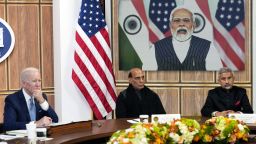f6d5de58-3e7e-4a5c-afa3-952e83008412.mp4
03:14
- Source:
cnn
Russian opposition leader. Anti-corruption campaigner. Assassination attempt survivor. Prisoner.
Alexey Navalny’s crusade against the Kremlin has brought him many labels.
And with the eyes of the world now on Russian President Vladimir Putin amid his brutal invasion of Ukraine, Navalny’s message of resistance is finding new weight inside and outside of Russia, even as he remains behind bars.
“The only thing necessary for the triumph of evil is for good people to do nothing,” he says, reprising the famous quote of unknown origin, in the new CNN film “Navalny,” which premieres this Sunday, April 24, at 9 p.m. ET on CNN. “So don’t be inactive.”
Here’s what you need to know about Navalny’s political rise, attempted assassination and future in Russia:
Rise to prominence Navalny first gained visibility in 2008, when he started blogging about alleged corruption within Russian state-run companies. By 2011, he had emerged as one of the leaders of the massive protests that had broken out after allegations of fraud in parliamentary elections.
“Those who have gathered here can kick these thieved ass***** out of the Kremlin tomorrow,” Navalny said at one 2011 protest.
He posted his first YouTube video, a step-by-step instruction guide showing how to build an “agitation cube,” a boxlike tent structure with his image emblazoned on the side, in July 2013. The clip marked the start of the Russian dissident’s campaign to be elected Moscow mayor, and the humble beginning of his YouTube revolution.
But his movement was blunted when he was convicted on embezzlement charges, just as he was preparing to run for mayor. Navalny has denied the charges and called them politically motivated. A retrial in 2017 barred him from running for public office — this time for president against Putin.
While Navalny is most well known as an activist, it’s his investigations that have been the biggest thorn in the side of some of Russia’s powerful people. His videos about the apparent unexplained wealth of top government officials have particularly raised the ire of the Kremlin.
One video about former Russian Prime Minister Dmitry Medvedev drew more than 35 million views on YouTube.
But with increased results came increased risks. In March 2017, that video lit a spark under the biggest anti-government protests Russia had seen in years. Thousands joined rallies in almost 100 cities across Russia. Navalny himself was arrested and jailed for 15 days.
The following month, he was splashed with an antiseptic green dye, damaging his vision in one eye.
“Listen, I’ve got something very obvious to tell you. You’re not allowed to give up. If they decide to kill me, it means that we are incredibly strong,” Navalny said to his supporters in the CNN film.
“We need to utilize this power, to not give up, to remember we are a huge power that is being oppressed by these bad dudes. We don’t realize how strong we actually are,” he continued.
Poisoning and recovery By 2020, there were signs that the ground was shifting beneath Navalny’s opposition movement.
The Kremlin had taken on a more publicly confrontational posture toward its chief critic, culminating in accusations of a poisoning attempt in August of that year.
Navalny had started feeling unwell on a return flight to Moscow from the Siberian city of Tomsk. Loud groaning can be heard in video footage apparently recorded on the flight he took. More video apparently recorded through the airplane window showed an immobile man being taken by wheeled stretcher to a waiting ambulance.
Navalny was treated at a Berlin hospital, and the German government later concluded he had been poisoned with a chemical nerve agent from the Novichok group.
A joint investigation by CNN and the group Bellingcat implicated the Russian Security Service (FSB) in Navalny’s poisoning, piecing together how an elite unit at the agency had followed Navalny’s team throughout a trip to Siberia, when Navalny fell ill from exposure to Novichok.
The investigation also found that this unit, which included chemical weapons experts, had followed Navalny on more than 30 trips to and from Moscow since 2017. Russia denies involvement in Navalny’s poisoning. Putin himself said in December that if Russian security services had wanted to kill Navalny, they “would have finished” the job.
Nevertheless, several Western officials and Navalny himself have openly blamed the Kremlin.
“It’s impossible to believe it. It’s kind of stupid that the whole idea of poisoning with a chemical weapon, what the f**k?” Navalny says in the new CNN film. “This is why this is so smart, because even reasonable people they refuse to believe like, what? Come on … poisoned? Seriously?”
News that Navalny had fallen gravely ill sent a fresh shock wave through Russian society, raising worrying parallels with some of the more brazen political killings in Russia’s recent past.
Western governments, independent researchers and Russia watchers have noted a consistent pattern of Russian state involvement in assassinations both inside Russia and abroad.
Click here to read the full story.
Tune in tomorrow at 9 p.m. ET to watch the CNN Film “Navalny” on CNN.














